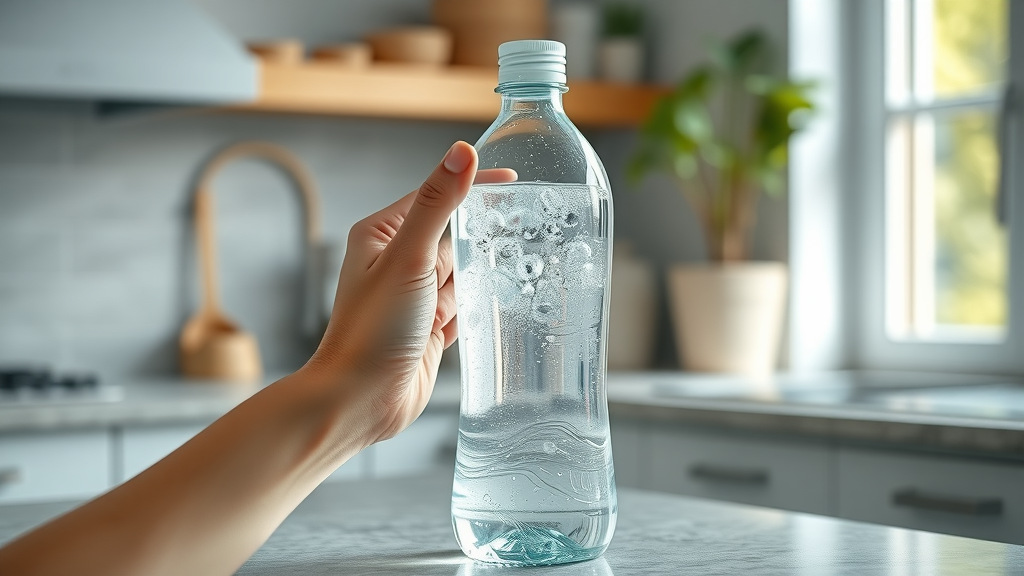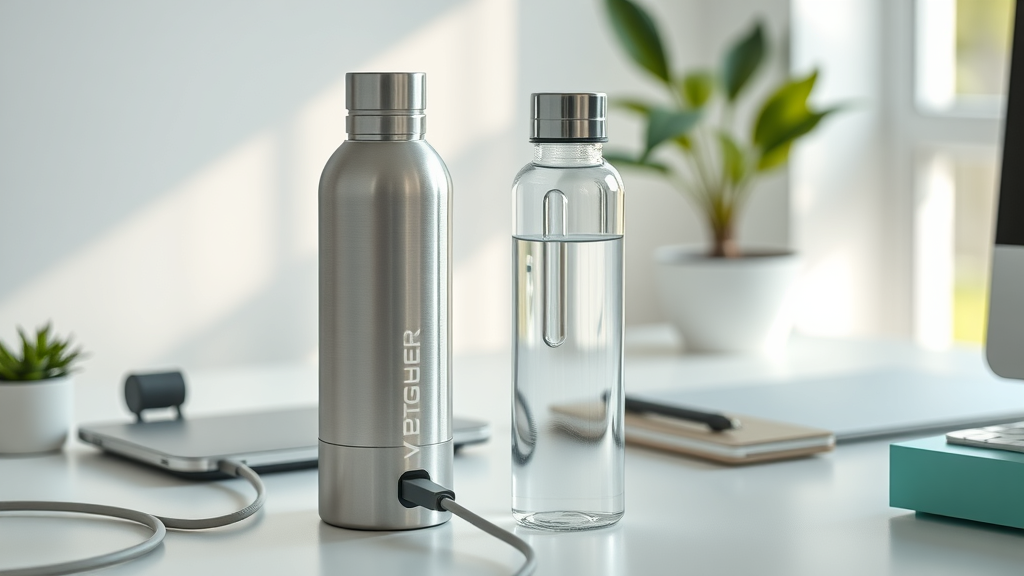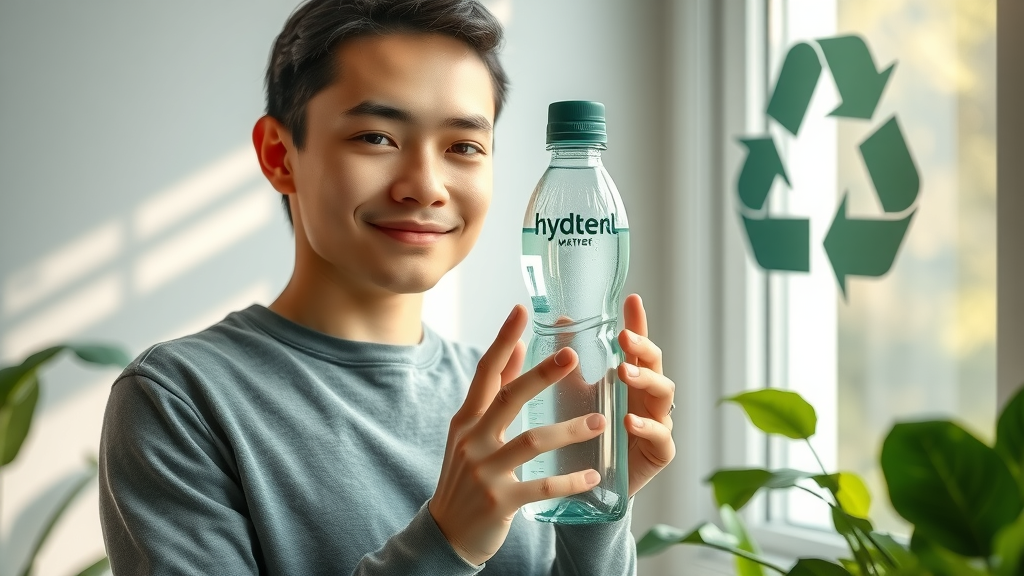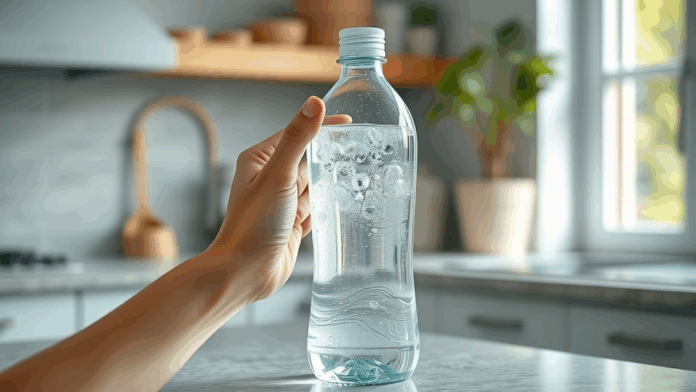Did you know? A recent study found that the global hydrogen water bottle market is projected to grow by over 10% annually—proof that wellness seekers are actively investigating their options. If you want to maximize your daily hydration with innovative technology, understanding the difference between a rechargeable vs non-rechargeable hydrogen water bottle is the crucial first step.
“A recent study found that the global hydrogen water bottle market is projected to grow by over 10% annually—proof that wellness seekers are actively investigating their options.”
Revealing the Difference: Why the Choice Between Rechargeable vs Non-Rechargeable Hydrogen Water Bottle Matters
Choosing between a rechargeable vs non-rechargeable hydrogen water bottle is more than just picking the latest gadget—it’s about aligning with your lifestyle, wellness goals, and environmental values. As more people explore hydrogen water for its reported health benefits—from neutralizing free radicals to promoting better energy—your water bottle choice dictates how easily you can stay hydrated with molecular hydrogen at home, work, or on-the-go. These choices also have implications for long-term cost, ease of use, and sustainability—a big reason why both water bottle types are gaining so much traction in consumer reviews.
Understanding the differences affects convenience, performance, and even your carbon footprint. Rechargeable hydrogen water bottles offer modern tech benefits like USB charging, reliable hydrogen production, and fewer recurring expenses. Non-rechargeable options, although budget-friendly up front, may require ongoing cartridge or tablet costs, which could add up over time. Whether your priority is portability, eco-consciousness, or simply enjoying a glass of hydrogen-rich water whenever you like, evaluating these differences ensures you’ll make a choice that truly fits your needs.
What You’ll Learn in This Comparison of Rechargeable vs Non-Rechargeable Hydrogen Water Bottles
- Key differences between rechargeable and non-rechargeable hydrogen water bottles
- Benefits of hydrogen water and device technology
- Feature-by-feature breakdown, including cost, convenience, and longevity
- Expert recommendations and consumer reviews
Hydrogen Water and Hydrogen Water Bottles: What Are They?
Understanding Hydrogen Water and How Hydrogen Water Bottles Work
Hydrogen water refers to drinking water that’s been infused with additional hydrogen gas molecules, boasting potential health benefits like combating oxidative stress and providing antioxidant properties. Unlike regular water, hydrogen-rich water contains a high concentration of dissolved hydrogen, which some studies suggest may help reduce inflammation, boost energy, and offer cellular protection from free radicals.
Hydrogen water bottles or hydrogenators achieve this by using electrolysis or a chemical reaction. In rechargeable bottles, built-in electrodes generate hydrogen gas that dissolves into the water when you start the cycle, often signaled by a blue light or visible bubbles. Non-rechargeable bottles typically use replaceable cartridges or tablets to infuse the water with hydrogen, providing a quick but often less consistent method to drink hydrogen. Whether you’re using PIURIFY Hydrogen, a PIURIFY Hydrogenator, or another brand, these devices are engineered to deliver molecular hydrogen straight to your drinking water—making it easy to stay hydrated with extra benefits.

Benefits of Hydrogen: Why Drink Hydrogen in Your Water Bottle?
Why should you consider drinking hydrogen water from a specialized bottle? Molecular hydrogen has garnered interest for its:
- Antioxidant properties: Neutralizes free radicals to combat oxidative stress and may reduce cell damage.
- Improved energy levels: Some users report feeling more alert and energetic after incorporating hydrogen-rich water into their routines.
- Potential health benefits as noted by studies: Research suggests benefits ranging from reducing inflammation to supporting athletic recovery, although more studies are needed for conclusive evidence.
Drinking hydrogen water offers a refreshing twist on daily hydration, combining the essential task of drinking water with the potential benefits of hydrogen. For those seeking a wellness boost beyond regular water, these water bottles offer a straightforward, convenient solution.
Types of Hydrogen Water Bottles: Rechargeable vs Non-Rechargeable at a Glance
Rechargeable Hydrogen Water Bottles: Features, Operation, and Key Brands
Rechargeable hydrogen water bottles are designed for tech-savvy and health-focused consumers who want efficiency and convenience. These bottles operate using built-in batteries that are easily recharged via USB or AC adapters, making them highly portable for travel, work, or fitness activities. Brands like PIURIFY Hydrogen and similar market leaders offer advanced features such as quick hydrogen production, visible LED indicators (such as a blue light signaling active hydrogen production), and durable materials like borosilicate glass or stainless steel.
With rechargeable water bottles, you generally only need ordinary drinking water or filtered water—meaning you can fill the bottle on the go and still enjoy the benefits of rich hydrogen water, with a consistent (high-concentration) output. Maintenance is minimal, and the internal mechanisms are designed for durability, often supporting hundreds or thousands of charging cycles before replacement is necessary. This ensures a high return on investment for regular users who want fresh hydrogen water daily and value long-term reliability.

Non-Rechargeable Hydrogen Water Bottles and Hydrogenators: How Do They Compare?
Non-rechargeable hydrogen water bottles offer a simple, budget-friendly introduction to hydrogen water, ideal for occasional users or those testing the waters before committing to a higher-end device. These bottles rely on disposable cartridges, tablets, or manual infusers to generate hydrogen gas, with each cartridge typically providing a set number of uses before replacement is needed.
While these options don’t require electrical charging and may have a lower upfront cost, they do involve ongoing expenses and can be less consistent in their hydrogen production. The process is convenient for quick use but may result in a lower or variable hydrogen concentration, and the need for replacements means more waste—a key consideration for eco-conscious consumers. Non-rechargeable bottles are lightweight, portable, and maintenance is as easy as popping in a new cartridge or tablet, making them a practical option for infrequent hydration or as a trial solution.
| Feature | Rechargeable Hydrogen Water Bottle | Non-Rechargeable Hydrogen Water Bottle |
|---|---|---|
| Power Source | USB/AC Chargeable Battery | Disposable/Manual Cartridge/Tablet |
| Lifespan | 2-5 years+ | Single or limited use |
| Environmental Impact | More sustainable | More waste |
| Convenience | Portable, easy to use | Potentially less convenient |
| Cost | Higher initial, lower ongoing | Lower initial, higher ongoing |
Hydrogen Production and Performance: What to Expect
How Quickly Does a Hydrogen Water Bottle Charge and Produce Hydrogen?
Rechargeable hydrogen water bottles typically take 1 to 3 hours for a full charge, depending on their battery size and model. Once charged, most can produce one or several (up to 10–15) glasses or bottles of hydrogen-rich water from a single charge—making them ideal for traveling or a busy day’s hydration needs. The actual hydrogen production cycle in a bottle (the time to infuse hydrogen into a fresh fill) usually ranges from 3 to 7 minutes per use, signaled by a blue light or visible bubbling in the water.
Non-rechargeable hydrogenators, on the other hand, depend on the immediate chemical reaction from the cartridge or tablet. These can range from instant activation to a few minutes (depending on brand and water volume). However, you’ll notice that the hydrogen concentration may diminish over successive uses with a single cartridge, and you must keep replacement supplies on hand. Both models are designed for safe, reliable performance, but rechargeable bottles often outperform in terms of sustaining a high hydrogen concentration and reliability through the day.
PIURIFY Hydrogen and PIURIFY Hydrogenator: Comparing Hydrogen Production Efficiency
Comparing well-known brands such as PIURIFY Hydrogen (rechargeable) and PIURIFY Hydrogenator (non-rechargeable) underscores performance differences. Rechargeable models like PIURIFY Hydrogen typically use advanced platinum or titanium electrolytic plates to consistently generate hydrogen gas, maximizing dissolved hydrogen levels (often reaching high concentration quickly and retaining it for several hours). This is great for users who want potent, healthful hydrogen water from every fill.
In contrast, the PIURIFY Hydrogenator or other non-rechargeable hydrogen bottles rely on the chemical breakdown of included tablets to infuse water. While effective for occasional uses, these often provide less control over hydrogen levels, and tablets or cartridges must be closely monitored to ensure optimal performance. For users serious about consistent hydrogen production, rechargeable options offer greater efficiency, reliability, and freedom from the need to carry extra supplies.
Comparing Benefits: Rechargeable vs Non-Rechargeable Hydrogen Water Bottles
Durability and Reliability of Water Bottles
Durability is a major factor in deciding between a rechargeable vs non-rechargeable hydrogen water bottle. Rechargeable bottles typically use high-quality materials—such as medical-grade glass, stainless steel, or BPA-free plastics—that withstand daily wear, drops, and temperature changes. Many models are rated to last several years (often 2–5+), offering strong seals and rechargeable batteries with excellent longevity.
Non-rechargeable bottles, though lightweight and often affordable, may show wear quickly if constructed from lower-grade plastics. Since these rely on replaceable parts (cartridges or tablets), the bottle’s ongoing performance is directly linked to these consumables, and parts may become loose or degrade. For consumers wanting a reliable water bottle for the long term, rechargeable options are the superior choice—especially for regular hydration on hikes, commutes, or at the gym.

User Experience: Convenience On-the-Go
Convenience ranks high among users deciding between these water bottles. Rechargeable hydrogen water bottles offer excellent portability, as they’re easily powered via USB or power bank, and their battery life supports multiple cycles. Maintenance is simple—a regular rinse and periodic deep cleaning suffice, and you’re not tied to buying or carrying replacement cartridges.
- Battery life: Most models deliver multiple uses per full charge, keeping your water bottle ready throughout your busy day.
- Portability: Rechargeable bottles, with sturdy lids and secure charging ports, fit easily in bags for travel or outdoor activity.
- Ease of maintenance: No chemical residue; just rinse, charge, and refill as needed.
Non-rechargeable options, while light and simple, require you to manage cartridge stocks, and the process to insert or change tablets can disrupt the flow—especially during travel or outdoor activities. For active lifestyles or anyone who wants “grab-and-go” convenience, rechargeable models clearly come out ahead.
“With regular use, a rechargeable hydrogen water bottle may save you hundreds annually compared to single-use cartridges.”
Consumer Insights: Reviews and Recommendations on Hydrogen Water Bottles
What Do Real Users Say About Hydrogen Water Bottle Types?
User feedback reveals a clear trend: people love the ease and consistency of rechargeable hydrogen water bottles for daily use. Many highlight how the bottles maintain hydrogen concentration throughout the day and how convenient USB charging is—making travel, work, or workouts easier than ever. Customers point out features like reliable seals, visible signs of hydrogen generation (such as bubbling and a blue light), and minimal maintenance as major positives.
On the other hand, non-rechargeable bottle users appreciate the low entry cost and simplicity but note that the hassle of buying cartridges and sometimes inconsistent results are drawbacks. Environmental impact and ongoing costs also feature heavily in reviews—eco-conscious buyers and those aiming for long-term savings tend to favor rechargeable water bottles, while casual or trial users stick to non-rechargeable options. Across both groups, a desire for effective, easy-to-use hydrogen water devices is unanimous.

Which Hydrogen Water Bottle Does Gary Brecka Recommend?
Health and longevity expert Gary Brecka is known for advocating advanced wellness technologies, with a preference for reliable, rechargeable hydrogen water bottles. Brecka emphasizes brands that deliver consistent hydrogen production, robust build quality, and proven results. According to his recommendations and video reviews, bottles with the latest electrolytic cell technology—like PIURIFY Hydrogen—offer the purest and most effective hydrogen water and help users get the most from every bottle while minimizing costs and waste.
Cost Analysis: Initial Investment vs Ongoing Expense
Is a Rechargeable Hydrogen Water Bottle Worth the Price?
At first glance, the higher upfront price of a rechargeable hydrogen water bottle (typically $80–$200) may seem steep compared to non-rechargeable options ($30–$70). However, that investment pays off in the long run. With no ongoing need for replacement cartridges or tablets and energy-efficient charging, the ongoing cost is minimal. When averaged out over its lifespan, a rechargeable bottle becomes the budget-friendly choice for daily users.

Long-Term Savings with Rechargeable vs Non-Rechargeable Options
If you intend to drink hydrogen water regularly, the savings accumulate quickly. Non-rechargeable bottles, while cheaper up front, require frequent cartridge or tablet purchases, driving up yearly costs. Over one to three years, a rechargeable model not only eliminates this ongoing burden but also supports sustainability goals by generating less waste. For value-conscious buyers who want performance, reliability, and long-term savings, rechargeable bottles take the lead.
| Bottle Type | Average Cost (USD) | Replacement/Running Costs |
|---|---|---|
| Rechargeable | $80–$200 | Low (charging only) |
| Non-Rechargeable | $30–$70 | High (cartridges/tablets) |
Environmental Impact: Sustainability of Hydrogen Water Bottles
Rechargeable Hydrogen Water Bottles for Eco-Conscious Consumers
Eco-conscious individuals are increasingly selecting rechargeable hydrogen water bottles for their minimal environmental footprint. These bottles generate less waste, thanks to their long-lasting construction (often several years of safe use) and absence of disposable cartridges. Innovative manufacturers now use recyclable packaging, durable, chemical-free materials, and energy-efficient batteries—making every sip of hydrogen-rich water both healthful and sustainable.

Examining Disposable Waste from Non-Rechargeable Options
One key concern with non-rechargeable hydrogen bottles is the volume of disposable waste they produce. Each cartridge or tablet must be thrown out after use, and with regular consumption, this can add up to quite a bit of landfill-bound material—especially when compared to the near-zero waste of rechargeable models.
- Battery longevity: Rechargeable models are built for years of reliable use, decreasing demand for replacements.
- Use of disposable cartridges: Non-rechargeable bottles may generate significant waste over time.
- Recyclability: Rechargeable bottles with recyclable components help lower your carbon footprint, while single-use cartridges are rarely recyclable.
For buyers invested in sustainability and ecological responsibility, the advantages of a rechargeable water bottle make it the clear winner.
How to Select the Perfect Hydrogen Water Bottle for Your Lifestyle
Checklist: Deciding Between Rechargeable and Non-Rechargeable Hydrogen Water Bottles
Choosing the ideal hydrogen water bottle involves more than cost—it’s about matching your daily rhythm, health priorities, and environmental principles. Use our checklist to find your perfect fit:
- Daily usage needs
- Portability
- Maintenance preferences
- Environmental priorities
For heavy daily users prioritizing performance and eco-friendliness, rechargeable models are generally superior. Occasional drinkers or those wanting the lowest up-front investment may find non-rechargeable bottles a suitable entry point.
FAQs on Rechargeable vs Non-Rechargeable Hydrogen Water Bottles
- What is the lifespan of a rechargeable hydrogen water bottle? — Most rechargeable bottles last 2–5 years or longer with proper maintenance.
- Are there safety concerns with either type? — Both types are safe for drinking water. Rechargeable bottles include safety certifications, while non-rechargeable bottles should use certified food-grade tablets.
- Do hydrogen water bottles require special water? — No. You can use tap, filtered, or bottled water; however, filtered water ensures device longevity and optimal taste.
People Also Ask: Your Top Questions Answered
Do hydrogen water bottles need to be recharged?
Answer: Rechargeable hydrogen water bottles require periodic charging via USB or AC power, whereas non-rechargeable bottles either use replaceable cartridges or tablets and do not require electric charging.
What hydrogen water bottle does Gary Brecka recommend?
Answer: Renowned wellness expert Gary Brecka has been known to recommend reliable brands offering advanced rechargeable hydrogen water bottles, emphasizing efficiency and purity of hydrogen production.
How long does a hydrogen water bottle take to charge?
Answer: Most rechargeable hydrogen water bottles take between 1 to 3 hours to fully charge, depending on the model and battery capacity.
How to know if a hydrogen water bottle is working?
Answer: Functional hydrogen water bottles often display micro-bubbles, emission of gas, or a change in LED indicator after activation, confirming that hydrogen is being generated.
Key Takeaways: Making a Smart Choice on Hydrogen Water Bottles
- Rechargeable vs non-rechargeable hydrogen water bottles vary in convenience, cost, and sustainability
- Evaluate your priorities: regular usage, cost-effectiveness, and eco-friendliness
- Choose based on long-term value and performance
Ready to Experience the Benefits of Hydrogen Water? Compare the Latest Rechargeable vs Non-Rechargeable Hydrogen Water Bottles Now
Make your hydration smarter and more rewarding—review the top-rated rechargeable and non-rechargeable hydrogen water bottles today to discover which will help you drink hydrogen and stay at your healthiest, every day!
Conclusion
Whichever hydrogen water bottle you choose, consider your long-term health, convenience, and environmental impact to ensure your next purchase makes every sip count.
When choosing between rechargeable and non-rechargeable hydrogen water bottles, it’s essential to consider factors like convenience, cost, and environmental impact. Rechargeable models, such as the Saikun Portable Hydrogen Water Bottle, offer USB charging and advanced PEM technology for efficient hydrogen production. (shopusa.pk) On the other hand, non-rechargeable options may have lower initial costs but often require ongoing expenses for replacement cartridges or tablets, which can add up over time. Additionally, non-rechargeable bottles can generate significant waste due to disposable components. (piurify.com) If you’re serious about integrating hydrogen-rich water into your daily routine, these resources will provide valuable insights to help you make an informed decision.


